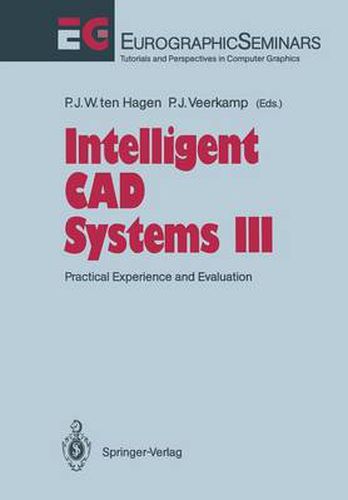Readings Newsletter
Become a Readings Member to make your shopping experience even easier.
Sign in or sign up for free!
You’re not far away from qualifying for FREE standard shipping within Australia
You’ve qualified for FREE standard shipping within Australia
The cart is loading…






This title is printed to order. This book may have been self-published. If so, we cannot guarantee the quality of the content. In the main most books will have gone through the editing process however some may not. We therefore suggest that you be aware of this before ordering this book. If in doubt check either the author or publisher’s details as we are unable to accept any returns unless they are faulty. Please contact us if you have any questions.
This book contains a selection of revised versions of papers presented at the Third Eurographics Workshop on Intelligent CAD Systems, which was held at Hotel Opduin on the island of Texel in The Netherlands, April 3-7, 1989. The workshop theme was Practical Experience and Evaluation. It included five paper presentation sessions, each followed by a discussion. The workshop closed with a general discussion. The book is therefore divided into five parts: design process, system architecture, languages, geometric reasoning, and user interface. A report on the discussion session, written by the session’s moderator, concludes each part. These reports are not intended to be exact records of the discussion, but rather the moderators’ summary of their contents. The aim of the workshop was to share the experience the participants gained by developing intelligent CAD (Computer Aided Design) systems, and to evaluate the developed systems to determine which features were still lacking. The workshop was organized as the last one in a series of three workshops under the same title. The first workshop focused on theoretical and methodological aspects, resulting in a sound theoretical basis for intelligent CAD systems. Implementational issues were discussed at the second workshop, paying attention to systems developed with reference to this basis. The experience and evaluation showed a dual outcome. Firstly, it resulted in the development of a new generation of intelligent CAD systems. Secondly, it led us to the development of new theories for intelligent CAD.
$9.00 standard shipping within Australia
FREE standard shipping within Australia for orders over $100.00
Express & International shipping calculated at checkout
This title is printed to order. This book may have been self-published. If so, we cannot guarantee the quality of the content. In the main most books will have gone through the editing process however some may not. We therefore suggest that you be aware of this before ordering this book. If in doubt check either the author or publisher’s details as we are unable to accept any returns unless they are faulty. Please contact us if you have any questions.
This book contains a selection of revised versions of papers presented at the Third Eurographics Workshop on Intelligent CAD Systems, which was held at Hotel Opduin on the island of Texel in The Netherlands, April 3-7, 1989. The workshop theme was Practical Experience and Evaluation. It included five paper presentation sessions, each followed by a discussion. The workshop closed with a general discussion. The book is therefore divided into five parts: design process, system architecture, languages, geometric reasoning, and user interface. A report on the discussion session, written by the session’s moderator, concludes each part. These reports are not intended to be exact records of the discussion, but rather the moderators’ summary of their contents. The aim of the workshop was to share the experience the participants gained by developing intelligent CAD (Computer Aided Design) systems, and to evaluate the developed systems to determine which features were still lacking. The workshop was organized as the last one in a series of three workshops under the same title. The first workshop focused on theoretical and methodological aspects, resulting in a sound theoretical basis for intelligent CAD systems. Implementational issues were discussed at the second workshop, paying attention to systems developed with reference to this basis. The experience and evaluation showed a dual outcome. Firstly, it resulted in the development of a new generation of intelligent CAD systems. Secondly, it led us to the development of new theories for intelligent CAD.